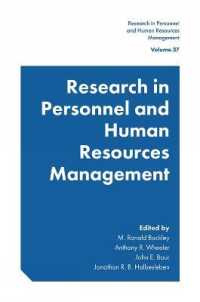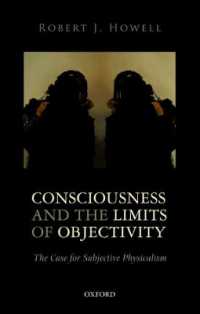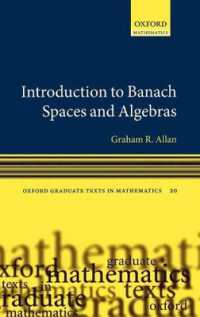- ホーム
- > 洋書
- > 英文書
- > Psychology
Full Description
The Oxford International Handbook of Creativity and Education brings together cutting-edge scholarship about the global trends and future directions of creativity in education. Diverse models and frameworks capture the state of the field with a focus on cognitive, social, and cultural areas of creativity in education. Barriers and supports to creativity are examined in educational policy, assessment, curriculum, classroom environments, and school contexts. This handbook is designed to propagate new research and applications in the field by helping students, researchers and program evaluators understand and apply these models of creativity to how students, teachers and leaders enact creativity in learning, teaching, and leading. The handbook will inspire new work to advance the study and practice of creativity in education.
Section I provides an overview of creativity frameworks, models, and pedagogies of education to anchor the handbook. Research on creativity in students, teachers, and schools are discussed in Section II. Culture and communities of creativity are explored in depth in Section III. Section IV covers creativity in academic disciplines like art, music, math, science, and engineering. Lastly, Section V provides thought-provoking chapters on researching education.
Contents
Introduction
Jennifer Katz-Buonincontro, Drexel University
Todd Kettler, Baylor University
Section 1: Frameworks, Models and Pedagogies for Creativity and Education
1. Tracing the Arc of Creativity in Educational Philosophies: Broadening the Foundations for Research and Pedagogy
Jennifer Katz-Buonincontro, Drexel University
Todd Kettler, Baylor University
2. Teaching for Creativity Was the Right Answer to the Wrong Question: So, What Should We Have Asked?
Robert Sternberg, Cornell University
3. Seeing the Creativity in Talent Development Processes
Jeb Puryear, University of Montana
4. Creativity Development in Adolescence and Emerging Adulthood: From Education Policies to the Classroom
Baptiste Barbot, Université Catholique Louvain, Belgium
Dominik Golab, Université Catholique Louvain, Belgium
5. Creative Problem-Solving: Processes, Strategies, and Skills for Education
Michael D. Mumford, The University of Oklahoma
Mark W. Fichtel, The University of Oklahoma
6. Creative Pedagogies in Education
Leon R de Bruin, University of Melbourne
7. Designing for Creative Learning: How Instructional Designers Can Influence the 5 As of Creativity
Richard E. West, Brigham Young University
Jason K. McDonald, Brigham Young University
Punya Mishra, Arizona State University
Melissa Warr, New Mexico State University
8. Self-Regulated Learning and Mind Wandering: The Embedded Paradox of the Creative Process
Lisa DaVia Rubenstein, Ball State University
Gregory Boldt, University of Connecticut
James Galliher, University of Indiana - Purdue University, Indianapolis
9. Exploring the Intricate Relationship between Creativity, Learning, and Academic Achievement
Selcuk Acar, University of North Texas
Janessa Bower, University of North Texas
10. Extracurricular Programs and Out-of-School Time Activities as Contexts Supporting Creativity and Problem-Solving
Megan L. Atha, Florida Gulf Coast University
Section 2: Creative Students, Teachers, and Schools
11. What Do Teachers Need to Know about Teaching for Creativity? Myths and Suggested Practices of Creative Education
Sue Hyeon Paek, University of Northern Colorado
Emily Romero, University of Northern Colorado
Chelsea Miller, University of Northern Colorado
12. Developing Creativity in Early Childhood: The Role of Pretend Play
Sandra W. Russ, Case Western Reserve University
Kerrigan Vargo, Case Western Reserve University
13. Connecting Creativity with High-Impact Practices in Undergraduate Education
Angie L. Miller, Indiana University Bloomington
14. Two Decades of Research on Creative Self-Beliefs: Implications for Educational Practice
Paula Álvarez-Huerta, Mondragon Unibertsitatea
Inaki Larrea, Mondragon Unibertsitatea
Alexander Muela, University of the Basque Country
15. Are Creative Students More Successful in College?
Jean E. Pretz, Elizabethtown College
Megan Kuczma, Elizabethtown College
16. Benchmarking Creativity in Organizations
Roni Reiter Palmon, University of Nebraska Omaha
Meagan Millier, University of Nebraska Omaha
17. The Intersection of Creativity and Leadership in Education
Molly Holinger, SUNY Buffalo State
Gerard J. Puccio, SUNY Buffalo State
Peter Loehr, SUNY Buffalo State
Section 3: Culture and Communities of Creativity
18. The Role of Openness to Experience in Finding Creative Students
Alexandra Vuyk, Aikumby Center for Giftedness and Creativity, Universidad Catolica
Nuestra Señora de la Asuncion; Asuncion, Paraguay
Barbara Kerr, Center for Creativity and Entrepreneurship Education, The University
of Kansas; Lawrence, KS
Maureen Montanía, Aikumby Center for Giftedness and Creativity, Universidad
Catolica Nuestra Señora de la Asuncion; Asuncion, Paraguay
19. Creativity, Culture, and Education: An Invitation to Think about the Future
Mônica Souza Neves-Pereira, University of Brasilia - UnB - Brasília/DF - Brazil
20. On Higher Education, Deliberative Encounters, and Play: Towards the Cultivation of Creative Action
Yusef Waghid, Stellenbosch University
21. Creativity and Equity: Dovetailing Pedagogies for Social Justice
Sarah R. Luria, University of Connecticut
James C. Kaufman, University of Connecticut
Lihong Xie, University of Connecticut
22. Family Influences on Creativity
Jiajun Guo, East China Normal University
Jin Qian, East China Normal University
Weiguo Pang, East China Normal University
23. Creativity in Gifted Education Policy and Assessment: An Introduction of a New Measure of Original Thinking in Elementary Students (MOTES)
Grantham, Tarek .C., University of Georgia
Acar, Selcuk., University of North Texas
Dumas, Denis., University of Georgia
Fox, Sonja, Duluth, Georgia
24. Academically Gifted Black Males: Exploring Creativity Through Qualitative Research
Fred A. Bonner II, Prairie View A&M University
Alonzo Flowers, The University of Texas at San Antonio
Stella Smith, Prairie View A&M University
Jerrel Moore, Prairie View A&M University
Ramon Goings, University of Maryland, Baltimore County
Dave Louis, The University of Houston
William Parker, Prairie View A&M University
Section 4: Creativity in the Disciplines
25. Using Creative Writing to Fuel Creativity
Francis Gilbert, University of London
26. Fostering Creativity through Design-Based Learning in STEM Education
Sema Tan, Sinop University
Esra Bozkurt Altan, Sinop University
27. Creativity in Engineering Education
David Cropley, University of South Australia
28. Creativity and Mathematics Education
Scott Chamberlin, University of Wyoming
Rhett Anthony C. Latonio, Ateneo de Manila University
Ryan D. Fox, Belmont University
29. Mathematical Creativity
Gülsah Batdal-Karaduman, Istanbul University-Cerrahpasa
30. Integrating Creativity in Science Education
Kristen Lamb, University of Alabama
Diana Dekelaita-Mullet, Navajo Technical University
31. Fostering the Creativity of Neurodivergent Individuals in Music Education
Rhoda Bernard, Berklee College of Music
32. Culturally Responsive Visual Art Teaching for Student Creativity
Richard Seigesmund, Northern Illinois University
Bernard Young, Arizona State University
33. Creative Reading in the Digital Information Age
Inge van de Ven, Tilburg University
Section 5: Researching Creativity in Education
34. Youth Action: School-Based Creative Problem-Solving Training to Build Individual and Community Well-being
Jessica D. Hoffmann, Yale University
Jennifer Seibyl, Yale University
Maneeza Dawood, Columbia University
35. Measuring Creative Potential and Its Development
Anaelle Camarda, Institut Supérieur Maria Montessori
Todd Lubart,Université Paris Cité and Univ Gustave Eiffel, LaPEA
36. Measuring Creative Potential and Growth in PreK-12 Education Contexts
Jonathan A. Plucker, Johns Hopkins University
Melanie S. Meyer, Baylor University
37. Assessing Creative Thinking at Scale and Across Culture: The PISA 2022 Assessment
Natalie Foster, The Rockefeller Foundation
Mario Piacentini, Organisation for Economic Co-operation and Development
38. Creativity for the 21st Century: A Critical Appraisal
Sue Grey, Inland Norway University of Natural Sciences
39. Assessing Creativity in the School Environment: Evidence-Based Practices and Future Directions
Denise de Souza Fleith, University of Brasilia
Daniela Vilarinho-Pereira, Purdue University
40. Collaborative Creativity Processes: Micro-level Theory, Methods, Results, and Implications for Education
Ming Ming Chiu, EduHK
41. Conceptual Co-creativity
Janet Rafner, Aarhus University
42. What Do Creativity Researchers Owe to Education?
Ronald Beghetto, Arizona State University








